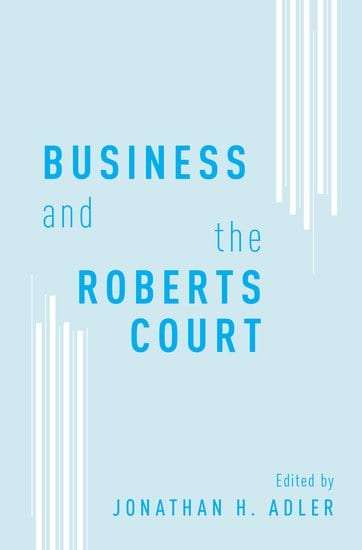The Volokh Conspiracy
Mostly law professors | Sometimes contrarian | Often libertarian | Always independent
Business and the Roberts Court

Is the Roberts court "pro-business"? Has the Supreme Court of the past 10 years been overly solicitous of business concerns at the expense of consumers, workers and the environment? Can the pattern of the Roberts court's decisions in business-related cases be explained by a pro-business bias? Or are other doctrinal and jurisprudential commitments at work?
"Business and the Roberts Court," my new book from Oxford University Press, explores these questions. In a series of essays by prominent legal scholars, "Business and the Roberts Court" unpacks the idea of a "pro-business" court to identify where the Roberts court has been favorable to business interests, and where it has not.
The contributors to "Business and the Roberts Court" are Matthew Bodie, Brian Fitzpatrick, Joel Gora, Rick Hills, Bradley Joondeph, Thom Lambert, Richard Lazarus, Mitch Pickerill and Adam Pritchard.
Early reviews of the book have been favorable. I was honored (and humbled) to receive the following jacket blurbs:
"Determining whether the Roberts Court is a 'business court' requires going beyond superficialities and examining specific doctrines and cases. This volume does that brilliantly."
-Paul Clement, Bancroft PLLC, 43rd U.S. Solicitor General"Finally. We now have a collection of pieces from the leading scholars in the field that takes us beyond the rhetoric of the Roberts Court as 'pro-business.' It is an indispensable volume for anyone giving serious thought to these important issues."
-Tom Goldstein, Publisher, SCOTUSblog"It is commonplace for politicians, journalists, and the public at large to debate whether the Supreme Court is 'pro-business.' As the essays in this outstanding volume demonstrate, however, this is not just the wrong question-it is an inherently incoherent question. One cannot analyze Supreme Court decisions by simply totting up wins and losses from a single term, as many mindless end-of-term articles try doing. Instead, one must take a longer view over many terms. But even if one does so it is rarely obvious that specific decisions can be easily categorized as pro- or anti-business. Accordingly, the contributors to this volume bring to bear a much more sophisticated set of tools to analyze how the Supreme Court affects business. It will therefore require a place on the bookshelf of any lawyer, judge, or academic who cares about the relationship of law and business."
-Stephen M. Bainbridge, William D. Warren Distinguished Professor of Law, UCLA School of Law
To further explore the issues raised in the book, and look ahead to how business issues may be addressed by the court in the years to come, the Center for Business Law and Regulation is sponsoring a conference at Case Western Reserve University School of Law on Friday, Sept. 23. Speakers include Todd Henderson, Brianne Gorod, Karen Harned, Eric Murphy, Catherine Sharkey and many others. The conference is free - as is the live webcast - and 4.5 hours of CLE credit are available for a modest fee. Registration info is here.
For those interested, the book is available on Amazon and direct from OUP. Additional posts will highlight specific chapters and findings from the book in the coming weeks.


Show Comments (0)